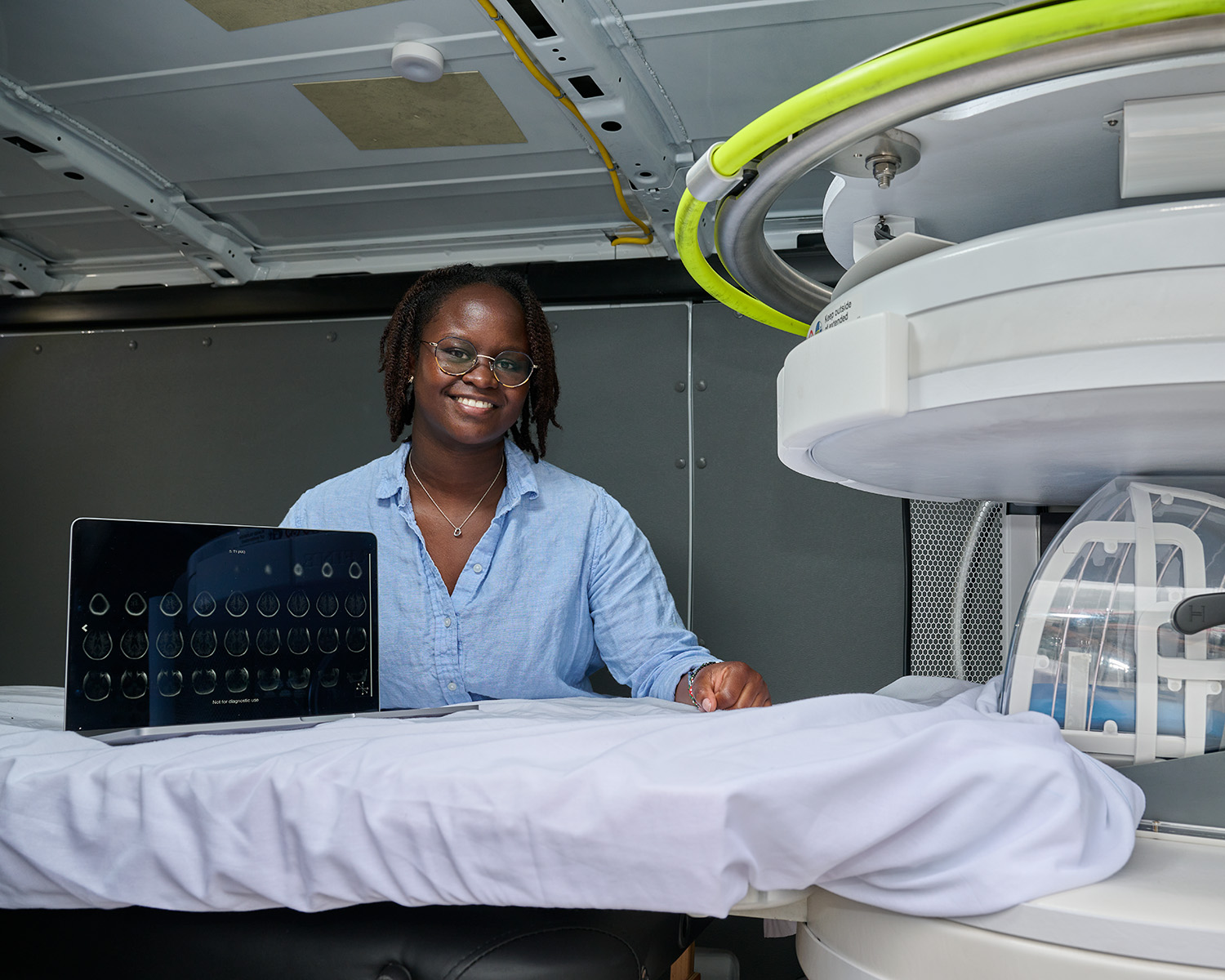Out of the Minds of Babes

Amanda Yagan '21 (CLAS) uses this portable Hyperfine MRI scanner, which has a slot only for a person's head, to take MRIs right outside of study participants' homes. For a Gates Foundation effort, Yagan has also traveled to India and Africa, training doctors to use these machines to increase access to MRI technology.
While running through an assessment with a young subject recently, Amanda Yagan '21 (CLAS) asked, "What do we use to tell the time?" Without skipping a beat, the boy confidently answered, "Alexa!"
The fact that he had no clue why his answer invoking the smart speaker made his mom and Yagan laugh underscores exactly what Yagan studies: how environmental factors, such as exposure to electronics, shape young brains and bodies.
As a clinical research assistant in the Advanced Baby Imaging Lab at Rhode Island Hospital, Yagan interviews children, leading them through the Mullen assessment scales cognitive test and iPad games. She also administers MRI and other scans, all in an effort to better understand how brains grow and develop through infancy and childhood, and how factors such as genes, nutrition, exposure to electronics, and sleep shape this development.
"I love getting to work with kids," says the speech, language, and hearing sciences major, who radiates such warmth and enthusiasm that it's easy to imagine just how comfortable she makes these little ones.
"Often the children get really shy at the beginning "¦ and at the end they independently give me hugs, or sometimes they'll want me to carry them around the lab, and we just hang out and bond as we pick out books for them to take home. I love that we are able to pick up on each other's energy and know that we are in a safe space."
Other perks that make her gig so cool? Yagan enjoys regularly having her mind blown by the work of her brilliant colleagues, as well as Bill and Melinda Gates Foundation"“funded trips to India, Zambia, South Africa, and Uganda to train doctors there to use portable MRI scanners, like the one she's pictured with here.
"I'm so excited to go to work" each day, she says. "I come home and I'm so happy."
It wasn't always that way. Yagan worked hard to put herself through school at UConn, including at a string of "horrible" jobs before landing a position in psychology professor Inge-Marie Eigsti's Connecticut Autism and Language Lab (CALL) and finding work that "just started a spark that's slowly been lighting up" since.
After finishing high school in her native Kenya, "the world was mine for the taking, but I had no idea where to start," Yagan says. She discovered speech therapy through an article shared by a family member.
She had many friends in school with stutters and other communication disorders and finding out there was a discipline aimed at helping people like them gave her a new goal. But no university in Kenya offered a speech therapy program, and it was too expensive to move to the U.S. to attend one, so she began studying psychology at the University of Nairobi. Then, Yagan was granted a green card to join her mother in the U.S. in 2017.
After immigrating to Putnam, Connecticut, Yagan applied to UConn to pursue her dream.
"It wasn't as easy as I make it seem. I am just an immigrant trying to navigate the whole American system; everything is new. How people drive their cars is different, how they speak is different — so now trying to enroll in university is a whole new ballgame," she says. Her mom pushed her to find her own way through the application process, and Yagan applied only to UConn as she could afford just one $80 application fee.
"My UConn experience was not the typical college experience," she recalls. As an undergraduate, Yagan worked up to four jobs at a time, and cared for her mother after she became ill. Yagan's mother passed away during her junior year.
When she decided to pursue graduate school and learned she'd be required to show research experience to apply, "I panicked. Here's another thing I need to do," she says.
She emailed several professors asking for a lab position, and Eigsti said, "Sure!"
"She opened a whole new world for me," Yagan says. Under the mentorship of Eigsti and postdoctoral fellow Caroline Larson, Yagan learned the ins and outs of conducting research, successfully balanced her full-time work with school and the lab, connected with professionals in the field, and applied for jobs, landing her current position with one of the world's top baby-imaging researchers.
Larson "full-on took me under her wing. She just stuck her neck out for me," Yagan says.
While working in the lab started as something she needed to have on her resume to get into grad school, it became a goal in itself. Yagan recalls thinking, "Oh my gosh, I can do this for the rest of my life."
And it's all up from here, she says.
"It's been a struggle, but I'm on the other side of the tunnel."
By Julie (Stagis) Bartucca '10 (BUS, CLAS), '19 MBA
Photo by Peter Morenus

A wonderful story about an extraordinary young woman. There is no doubt that she will continue doing wonderful things regardless of her eventual career choice.